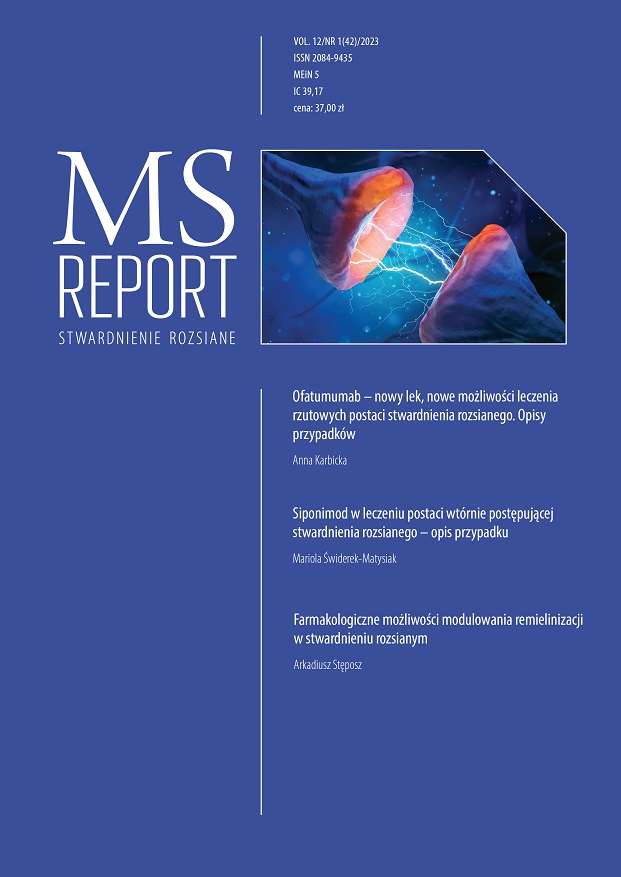Ofatumumab – nowy lek, nowe możliwości leczenia rzutowych postaci stwardnienia rozsianego. Opisy przypadków Opis przypadku
##plugins.themes.bootstrap3.article.main##
Abstrakt
Ofatumumab to w pełni ludzkie przeciwciało monoklonalne anty-CD20. Od niedawna stanowi ono cenną opcję w leczeniu nawracającej postaci stwardnienia rozsianego. Jako jedyny z obecnie dostępnych anty-CD20 podawany jest we wstrzyknięciu podskórnym co 4 tygodnie. Łatwy sposób aplikacji i brak konieczności hospitalizacji w celu jego podania to atuty leku. Badania kliniczne III fazy ASCLEPIOS I/II wykazały skuteczność ofatumumabu w zmniejszaniu rocznego wskaźnika rzutów i progresji niepełnosprawności klinicznej, a także w hamowaniu aktywności zmian w rezonansie magnetycznym u chorych z postacią nawracającą w obserwacjach trwających 1,5 roku (ASCLEPIOS I) i 1,6-roku (ASCLEPIOS II). Dysponujemy coraz większą ilością danych, uzyskanych zarówno w badaniu obserwacyjnym (ALITHIOS), jak i w codziennej praktyce klinicznej, na temat wysokiej skuteczności i korzystnego profilu bezpieczeństwa leku. Od listopada 2022 r. ofatumumab dostępny jest również w Polsce w ramach programu lekowego B.29 jako lek pierwszoliniowy. W niniejszym artykule przedstawiono opisy przypadków pacjentów leczonych ofatumumabem.
##plugins.themes.bootstrap3.article.details##
Copyright © by Medical Education. All rights reserved.
Bibliografia
2. NFZ. NFZ o zdrowiu. Stwardnienie rozsiane Online.
3. Trojano M, Lucchese G, Graziano G et al. Geographical variations in sex ratio trends over time in multiple sclerosis PLoS One. 2012; 7(10): e48078.
4. Saidha S, Bell J, Harold S et al. Systematic literature review of immunoglobulin trends for anti-CD20 monoclonal antibodies in multiple sclerosis. Neurol Sci. 2023; 44(5): 1515-32.
5. de Sèze J, Maillart E, Gueguen A et al. Anti-CD20 therapies in multiple sclerosis: From pathology to the clinic. Front Immunol. 2023; 14: 1004795.
6. Ministerstwo Zdrowia. Program lekowy; Leczenie Stwardnienia Rozsianego (ICD-10 G35).
7. Charakterystyka produktu leczniczego KESIMPTA (ofatumumab) (access: 22.03.2023).
8. Kappos L, Hauser SL. Therapy Session 3. Meet the Expert 2: Choosing therapy – similar compounds, same effect? ECTRIMS 2022.
9. von Essen R, Holm Hansen R, Højgaard C et al. Ofatumumab Modulates Inflammatory T Cell Responses and Migratory Potential in Patients With Multiple Sclerosis. Neurol Neuroimmunol Neuroinflamm. 2022; 9: e200004.
10. Wiendl H, Fox E, Goodyear A et al. Effect of subcutaneous ofatumumab on lymphocyte subsets in patients with RMS: Analysis from the APLIOS study. Eur J Neurol. 2020; 27: 1301.
11. Hauser SL, Bar-Or A, Cohen JA et al. Ofatumumab versus Teriflunomide in Multiple Sclerosis N Engl J Med. 2020; 383(6): 546-57.
12. Gärtner J, Hauser SL, Bar-Or A et al. Efficacy and safety of ofatumumab in recently diagnosed, treatment-naive patients with multiple sclerosis: Results from ASCLEPIOS I and II. Mult Scler. 2022; 28(10): 1562-75.
13. Cohen JA, Hauser SL, Cross AH et al. Five-Year Safety of Ofatumumab in People Living With Relapsing Multiple Sclerosis. Poster presentation at the American Academy of Neurology (AAN) 2023; April 22-27. Boston, MA, USA.
14. Cohen JA, Hauser SL, Zielman R et al. Effect of Longer-term Ofatumumab Treatment on Disability Worsening and Brain Volume Change. Oral presentation at the American Academy of Neurology (AAN) 2023; April 22-27, 2023; Boston, MA, USA.
15. Cutter G, Kappos L, Coyle et al. Improvement in Cognitive Processing Speed With Ofatumumab in Patients With Relapsing Multiple Sclerosis. Presented at the American Academy of Neurology 2023 Annual Meeting; April 22-27, 2023; Boston, MA, USA.

